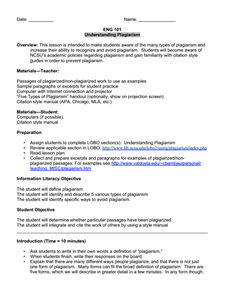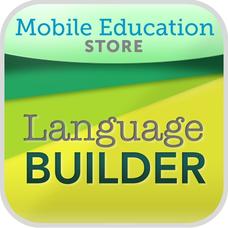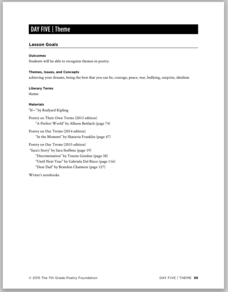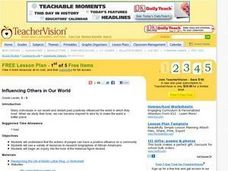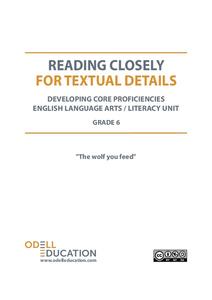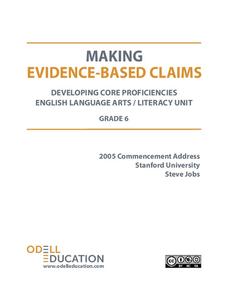Curated OER
Teaching Others About Being Deaf
Students read two articles about how college students taught others about being blind or deaf. In their school, they interview students with a physical challenge and use the internet to research how to write about those with...
North Carolina State University
Understanding Plagiarism
Introduce budding scholars to the many types of academic plagiarism. Potential plagiarizers develop a definition of the infringement and determine how it has been committed. The instructor provides the writing examples and resources....
Mobile Education Store
LanguageBuilder for iPad
Help your child hone his/her verbal communication skills and basic understanding of sentence structure with an app that promotes descriptive verbal interactions. The child is presented with an image, prompted to make a sentence, and then...
University of Pennsylvania
Decoding Propaganda: J’Accuse…! vs. J’Accuse…!
Reading snail mail is a great way to go back into history and to understand others' points of view. The resource, the second in a five-part unit, covers the Dreyfus Affair. Scholars, working in two different groups, read one letter and...
Teaching Tolerance
Mass Incarceration as a Form of Racialized Social Control
Mass incarceration: A result of a tough stance on crime or racial discrimination, you decide. Academics explore the history and reasons behind mass incarcerations in the United States and its impact on ethnic communities. The...
K12 Reader
Appositive Match
Here's a worksheet that assess how well kids understand appositives. After matching a series of general nouns with words or phases that tell more about the noun, learners uses the matched set to form sentences with appositives embedded.
Curated OER
Theme
A study of Rudyard Kipling's poem, "If," launches a lesson about theme. Class members read Kipling's poem and poems by other seventh graders to identify the themes.
Curated OER
Influencing Others in Our World
Learners discover that the actions of people can have a positive influence on a community. They use a variety of resources to research biographies of African Americans. Students research and discuss the life of Martin Luther King, Jr.,...
Curated OER
In 'Other words' Writing Gently Humorous Essays About Stereotypes
Define and understand what stereotypes are by reading an article with stereotyping in it. Students will locate how it shows stereotyping and answer questions about the stereotypes. Finally, they will write their own pieces of original work.
Museum of Disability
Don't Call Me Special
Introduce young learners to the idea of disabilities and making friends with children who are different than they are. Using Don't Call Me Special - A First Look at Disability by Pat Thomas, learners are guided through the new vocabulary...
Curated OER
Reading about Recent Exhibits in the Art and Design Section
A large part of analyzing or understanding art is knowing how to read about it. The New York Times has put together these who, what, where, when, and how questions to aid learners in comprehending informational pieces related to art and...
EngageNY
Pairing Texts: Understanding Brown v. Board of Education’s Impact on Carlotta’s Journey
Scholars work in groups to compare Brown v. Board of Education excerpts and A Mighty Long Way. They use the Paired Text note catcher to organize their thoughts and divide the work using a jigsaw activity to track Carlotta's journey.
Odell Education
Reading Closely for Textual Details: Grade 6
Close reading doesn't mean to literally read text close to your face, but rather to pay attention to particular details in order to develop a deep and purposeful understanding of text. The first part of a five-part resource provides an...
Odell Education
Making Evidence-Based Claims: Grade 6
In order to make evidence-based claims, one must be able to draw explicit information from text. From here, learners take that information, analyze the text to develop a deeper understanding, and connect with the information in order to...
Curated OER
1920s Variety Show
To better understand the cultural achievements of the Harlem Renaissance and become familiar with its major figures, class members examine a painting by Aaron Douglas and a poem by Langston Hughes and compare how the artists develop...
Safe Drinking Water Foundation
How Water Pollution Is Cleaned Up
As a follow-up from the previous instructional activity, young environmentalists discuss the benefits of water filtration and whether or not it's the best option. Other alternatives including air stripping, bioremediation, and...
John Talavera
Autism iHelp – Opposites
In/out, up/down, big/small; understanding opposites is a fundamental vocabulary-building skill. This app uses real-life photographs, to introduce the learner to the concept of opposites. Learning opposites is necessary for understanding...
Curated OER
How Are We Different?
Young scholars discuss the differences between boys and girls. In this acceptance lesson, students view pictures of boys and girls and use a Venn Diagram to chart their differences. Young scholars discuss boy activities and girl...
Macmillan Education
Cultural Awareness
The importance of cultural awareness, of becoming aware of our own and other cultures, and the benefits of gaining a deeper understanding of the differences between cultures, is the focus of this resource. Working individually, in pairs,...
Museum of Disability
Don't Laugh at Me
You can prevent bullying in your classroom by addressing kindness, empathy, and acceptance with your littlest learners early on. After reading Don't Laugh at Me by Steve Seskin and Allen Shamblin, kids discuss the ways that words can...
Curated OER
Exploring Media: Understanding and Identifying Editorial Perspective in Television and Radio News
Students research the topics Boat People: A Refugee Crisis, Dr. Henry Morgentaler: Fighting Canada's Abortion Laws, and CANDU: The Canadian Nuclear Reactor on the CBC Radio and Television Archives Web site.
Curated OER
Understanding and Fighting Stereotypes through Words and Images
Use some provocative modern art to get your class considering stereotypes and the impact they have on us all. Your class will discuss the print art Indian Look-Alike by Melanie Yazzie and stereotypes in general before conducting research...
Curated OER
Lesson 5- Symme "trees": Understanding Same
Pairs of socks can be the same and they can be different. Use socks to emphasise the meanings of the words same and different. Your special ed class will examine each pair of socks you provide to determine if they are the same or...
Curated OER
Understanding and Appreciating Poetry: Afro-Americans and Their Poetry
Sixth graders are introduced to poems written by African-American authors. As a class, they read excerpts of poems from different time periods and discuss how and if anything has changed over time with discrimination and equal rights...



